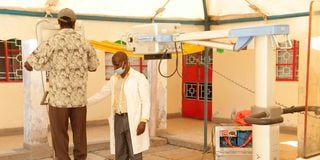World TB Day: Men have the highest burden of TB, but there's a way out

A medic helps a resident onto the platform of a digital x-ray machine during a Tuberculosis screening drive in Kisumu County on March 17, 2021.
It has been one year since Bernard Rotich, 32, was diagnosed with Multidrug-resistant tuberculosis (MDR TB).
It is a type of tuberculosis (TB) whose bacteria are resistant to two main TB drugs ( isoniazid and rifampin) rendering them ineffective.
For Bernard Rotich it was never good news as he got his positive result for MDR TB on the eve of marking World Tuberculosis Day last year.
He needed assurance on what was happening to his health and the diagnosis helped him be at peace with his fate.
“Before my diagnosis, I didn’t imagine that my persistent cough was TB. I had uncomfortable nights, dripping in sweat after having a long day with little food because I lost my appetite. It’s only when I lost weight that I decided to seek medical attention,” he told Nation.Africa.
The first hospital he went to told him that he had a bacterial infection and for a week, he was on medication to suppress that infection.
“I didn’t see any changes in my body. I even stopped taking the drugs I was given and opted to get a second opinion from a different hospital,” he said.
It is in his second hospital visit that he was diagnosed with MDR TB, which sometimes affects people who stop adhering to TB medication.
Owing to the contagious nature of TB, Mer Rotich was isolated in the hospital for a month and only allowed to go home after his health stabilised.
For the past 18 months, he has taken medication on a daily basis.
Research done by the LIGHT Consortium, a program under the African Institute for Development Policy (Afidep), released ahead of World TB Day on March 24, shows that men account for more than half of TB cases in the country.
Even though Mr Rotich is now free from the disease, he represents the 56 percent of men who suffer from the burden of a TB infection. Women on the other hand account for 32 percent of infections and children represent 11 percent of TB cases.
“It was tough for me as a family man to manage the disease and be on the lookout not to infect my kin. I can imagine the toll it has on family men living in single rooms, and are financially incapacitated. You need money for good food, and supplements to keep you afloat,” he said.
Data from the World Health Organisation (WHO) shows that Kenya is one of the 22 countries that contribute to about 80 percent of world TB cases. Kenya’s high burden leaves it ranking 15 out of the 22 most vulnerable countries globally.
Dr Leyla Abdullahi, Senior Research and Policy Analyst at Afidep told Nation.Africa that the gender disparity in TB cases highlights an important challenge for its prevention and care.
The LIGHT program now brings on board everyone, especially men who are disproportionately affected so as to create a clear path for eliminating TB by 2030 as per WHO’s projections.
According to Dr Abdullahi, the societal role of men being providers makes them prioritise their families even when they need to seek medical attention.
“Research has shown that men have a higher risk of being infected with TB, and later falling sick. Social and behavioral factors likely account for most of these gender differences in being infected with TB-causing organisms. Smoking, hazardous alcohol consumption, imprisonment, and employment in mines are risk factors for getting a TB infection,” she explained.
“Compared to women and children, men delay seeking care for TB symptoms. This means men experience TB disease for a long time before accessing treatment. Some of the reasons for this delay in TB care seeking could be how health facilities are structured. Men report feeling intimidated or not welcomed in health facilities, compared to women and children,” she added.
Even as the country is hoping to eliminate tuberculosis, Dr Abdullahi faults most TB interventions that do not keep men at the centre of it. She says that gender has an impact on the diseases’ transmission, testing, treatment, adherence, and outcome.
“Sufficient and consistent funding will be key to ensuring consistent and better TB services are available to everyone who needs them. This will require strong political will and commitment from the Kenya government and international development partners,” Dr Abdullahi told the Nation.
Rotich urges TB patients to adhere to their drugs because ‘it is the only way out’.





